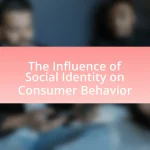The article examines the role of social proof in consumer decision-making, highlighting its significant influence on purchasing behavior. It discusses how social proof, manifested through customer reviews, testimonials, and endorsements, enhances trust and credibility in products and brands. Various types of social proof, including expert and celebrity endorsements, are explored, along with the psychological mechanisms that drive its effectiveness. The article also addresses the importance of social proof in marketing strategies, its impact on consumer trust, and the potential limitations and risks associated with over-reliance on social proof. Additionally, practical tips for businesses to effectively leverage social proof are provided, emphasizing the need for authenticity and relevance in marketing efforts.

What is the Role of Social Proof in Consumer Decision-Making?
Social proof significantly influences consumer decision-making by providing validation through the experiences and behaviors of others. When potential buyers observe that others have purchased or endorsed a product, they are more likely to perceive it as trustworthy and desirable. Research indicates that 70% of consumers look at reviews before making a purchase, highlighting the impact of social proof on their choices. Additionally, studies show that products with higher ratings and more reviews tend to sell better, demonstrating that social proof can effectively sway consumer preferences and increase sales.
How does social proof influence consumer behavior?
Social proof significantly influences consumer behavior by leveraging the tendency of individuals to look to others for guidance in uncertain situations. This phenomenon manifests in various forms, such as customer reviews, testimonials, and social media endorsements, which collectively create a perception of trustworthiness and reliability around a product or service. Research indicates that 70% of consumers trust online reviews as much as personal recommendations, highlighting the impact of social proof on purchasing decisions. Furthermore, a study published in the Journal of Consumer Research found that consumers are more likely to choose products that are popular among their peers, demonstrating that social validation can effectively drive sales and shape preferences.
What are the different types of social proof?
The different types of social proof include expert social proof, celebrity social proof, user social proof, wisdom of the crowd, and certification social proof. Expert social proof occurs when an authority figure endorses a product or service, influencing consumer trust; for example, a doctor recommending a specific medication. Celebrity social proof leverages the influence of well-known personalities to attract consumers, as seen in endorsements by athletes or actors. User social proof is demonstrated through customer reviews and testimonials, which provide real-life experiences that potential buyers can relate to. Wisdom of the crowd refers to the idea that if many people are doing something, it must be good, such as a product being labeled as a best-seller. Lastly, certification social proof involves third-party validation, such as awards or seals of approval, which enhance credibility and trustworthiness. Each type plays a significant role in shaping consumer perceptions and decisions.
How do consumers perceive social proof in marketing?
Consumers perceive social proof in marketing as a significant indicator of product quality and trustworthiness. This perception is rooted in the psychological principle that individuals often look to the behavior and opinions of others to inform their own decisions, especially in uncertain situations. Research indicates that 70% of consumers are influenced by online reviews and testimonials, highlighting the importance of social proof in shaping purchasing behavior. Additionally, studies show that products with higher ratings and more reviews are perceived as more credible, leading to increased sales and customer trust.
Why is social proof important in the decision-making process?
Social proof is important in the decision-making process because it influences individuals by providing evidence that others have made similar choices, thereby reducing uncertainty. Research indicates that consumers often rely on the behavior and opinions of others to guide their own decisions, particularly in situations where they lack sufficient information. For instance, a study published in the Journal of Consumer Research found that 63% of consumers are more likely to purchase a product if they see positive reviews or testimonials from other users. This reliance on social validation helps individuals feel more confident in their choices, ultimately impacting their purchasing behavior.
What psychological mechanisms drive the effectiveness of social proof?
The effectiveness of social proof is driven by several psychological mechanisms, primarily conformity, informational influence, and the desire for social validation. Conformity occurs when individuals align their behaviors or beliefs with those of a group, often to fit in or avoid social rejection. Informational influence arises when people look to others for guidance in uncertain situations, believing that the actions of others reflect accurate information about what is appropriate or correct. The desire for social validation motivates individuals to seek acceptance and approval from their peers, leading them to adopt behaviors that are perceived as socially acceptable. Research by Cialdini et al. (1990) demonstrates that individuals are more likely to engage in a behavior when they observe others doing the same, highlighting the powerful impact of these psychological mechanisms in consumer decision-making.
How does social proof affect trust and credibility in brands?
Social proof significantly enhances trust and credibility in brands by demonstrating that others have had positive experiences with them. When consumers observe that a brand is favored by peers, has numerous positive reviews, or is endorsed by influencers, they are more likely to perceive it as reliable and trustworthy. Research indicates that 79% of consumers trust online reviews as much as personal recommendations, highlighting the impact of social proof on consumer behavior. This phenomenon occurs because social proof reduces perceived risk and uncertainty, leading to increased brand loyalty and purchase intention.
What are the key factors that enhance social proof’s effectiveness?
The key factors that enhance social proof’s effectiveness include the credibility of the source, the number of people endorsing a product or service, and the relevance of the social proof to the target audience. Credible sources, such as experts or well-known brands, significantly increase trust and influence consumer decisions. Research indicates that when a product has numerous positive reviews or endorsements, it creates a perception of popularity, which can lead to higher conversion rates. Additionally, social proof that aligns with the values and preferences of the target audience is more impactful, as it resonates better with their specific needs and desires.
How does the source of social proof impact consumer decisions?
The source of social proof significantly impacts consumer decisions by influencing perceived credibility and trustworthiness. When consumers observe endorsements or testimonials from credible sources, such as industry experts or well-known influencers, they are more likely to trust the product or service being promoted. Research indicates that 92% of consumers trust recommendations from individuals over brands, highlighting the importance of the source. Furthermore, social proof from peers or user-generated content can enhance relatability, making consumers feel more confident in their purchasing choices. This effect is supported by studies showing that products with positive reviews from verified buyers experience higher sales conversion rates, demonstrating the direct correlation between the source of social proof and consumer behavior.
What role do influencers play in shaping social proof?
Influencers play a crucial role in shaping social proof by leveraging their authority and reach to validate products and services. Their endorsements create a perception of popularity and trustworthiness, which significantly influences consumer behavior. Research indicates that 70% of teenagers trust influencers more than traditional celebrities, highlighting their impact on purchasing decisions. By showcasing products in relatable contexts, influencers effectively demonstrate social proof, leading to increased consumer confidence and higher conversion rates.
How does the number of endorsements affect consumer trust?
The number of endorsements positively affects consumer trust by signaling credibility and social validation. Research indicates that consumers are more likely to trust products or services that have multiple endorsements, as these endorsements serve as social proof, suggesting that others have had positive experiences. A study published in the Journal of Consumer Research found that products with a higher number of endorsements were perceived as more trustworthy, leading to increased purchase intentions. This correlation highlights the importance of endorsements in shaping consumer perceptions and decision-making processes.
What are the limitations of social proof in consumer decision-making?
Social proof has limitations in consumer decision-making, primarily due to its potential to mislead consumers and create conformity bias. Consumers may rely on social proof, such as reviews or popularity, without critically evaluating the quality or relevance of the product, leading to poor purchasing decisions. For instance, a study published in the Journal of Consumer Research found that individuals often follow the choices of others even when those choices contradict their own preferences, indicating a tendency to conform rather than make independent decisions. Additionally, social proof can be manipulated through fake reviews or misleading endorsements, which can distort consumer perceptions and trust. This manipulation can result in consumers making choices based on inaccurate information, further highlighting the limitations of social proof in guiding informed decision-making.
How can negative social proof influence consumer choices?
Negative social proof can significantly influence consumer choices by leading individuals to avoid products or services perceived as unpopular or negatively reviewed. When consumers observe that others have had unfavorable experiences, they may infer that the product is of low quality or that it does not meet their needs. Research indicates that negative reviews can deter up to 70% of potential buyers, as seen in a study published in the Journal of Consumer Research, which highlights how negative feedback can overshadow positive attributes. This phenomenon occurs because consumers often rely on the experiences of others to guide their decisions, especially in uncertain situations, reinforcing the impact of negative social proof on their purchasing behavior.
What are the risks of over-relying on social proof in marketing strategies?
Over-relying on social proof in marketing strategies can lead to several risks, including diminished brand authenticity and potential consumer backlash. When brands excessively depend on social proof, they may prioritize popularity over quality, resulting in a misalignment between consumer expectations and actual product performance. This can erode trust, as consumers may feel manipulated if they perceive that a brand is artificially inflating its reputation through misleading testimonials or inflated metrics. Additionally, research indicates that excessive reliance on social proof can create a herd mentality, where consumers make decisions based on perceived popularity rather than informed choices, potentially leading to dissatisfaction and negative word-of-mouth.

How can businesses effectively leverage social proof?
Businesses can effectively leverage social proof by showcasing customer testimonials, reviews, and case studies prominently in their marketing materials. This strategy builds trust and credibility, as studies indicate that 79% of consumers trust online reviews as much as personal recommendations. By displaying positive feedback from satisfied customers, businesses can influence potential buyers’ decisions, leading to increased conversion rates. Additionally, incorporating user-generated content, such as photos or videos from customers using the product, can further enhance authenticity and relatability, reinforcing the positive perception of the brand.
What strategies can companies use to incorporate social proof?
Companies can incorporate social proof by showcasing customer testimonials, leveraging user-generated content, and displaying social media engagement metrics. Customer testimonials provide authentic feedback that builds trust; for instance, 79% of consumers trust online reviews as much as personal recommendations. User-generated content, such as photos or videos shared by customers, enhances credibility and relatability, with 79% of people saying user-generated content highly impacts their purchasing decisions. Additionally, displaying social media engagement metrics, like follower counts or likes, can signal popularity and trustworthiness, as 70% of consumers are influenced by the number of followers a brand has. These strategies effectively utilize social proof to influence consumer decision-making.
How can testimonials and reviews be utilized effectively?
Testimonials and reviews can be utilized effectively by strategically showcasing authentic customer experiences to build trust and influence potential buyers. Highlighting specific benefits and outcomes from real users can enhance credibility; for instance, a study by BrightLocal found that 91% of consumers read online reviews, and 84% trust them as much as personal recommendations. Additionally, displaying testimonials prominently on websites and social media platforms can increase engagement and conversion rates, as evidenced by a report from Nielsen, which states that 70% of consumers trust reviews from strangers. By integrating these elements into marketing strategies, businesses can leverage social proof to drive consumer decision-making.
What role does social media play in amplifying social proof?
Social media significantly amplifies social proof by providing a platform for users to share experiences and opinions, which influences the perceptions of others. This amplification occurs through features such as likes, shares, and comments, which create visible endorsements of products or services. For instance, a study by Nielsen found that 92% of consumers trust recommendations from friends and family over any other form of advertising, highlighting the effectiveness of social proof in shaping consumer behavior. Additionally, social media allows for rapid dissemination of user-generated content, making positive reviews and testimonials more accessible and impactful, thereby reinforcing trust and credibility in brands.
What best practices should businesses follow when using social proof?
Businesses should follow several best practices when using social proof to enhance consumer decision-making. First, they should display authentic testimonials from satisfied customers, as studies show that 79% of consumers trust online reviews as much as personal recommendations. Second, businesses should utilize user-generated content, such as photos or videos from customers, which can increase engagement by 28% according to research by Stackla. Third, showcasing social media follower counts or engagement metrics can create a sense of credibility; for instance, brands with a higher number of followers are perceived as more trustworthy. Lastly, businesses should highlight case studies or success stories that demonstrate the effectiveness of their products or services, as this can lead to a 20% increase in conversion rates, according to a report by HubSpot. By implementing these practices, businesses can effectively leverage social proof to influence consumer behavior positively.
How can businesses measure the impact of social proof on sales?
Businesses can measure the impact of social proof on sales through various methods, including A/B testing, customer surveys, and analyzing conversion rates. A/B testing allows businesses to compare sales performance between different versions of a product page, one with social proof elements like reviews and testimonials and one without, providing direct insights into how social proof influences purchasing decisions. Customer surveys can gather qualitative data on how social proof affects consumer perceptions and motivations, revealing the importance of social validation in their buying process. Additionally, analyzing conversion rates before and after implementing social proof strategies, such as displaying user-generated content or endorsements, can quantitatively demonstrate the correlation between social proof and increased sales. For instance, a study by BrightLocal found that 91% of consumers read online reviews, indicating that positive social proof can significantly enhance sales performance.
What common mistakes should be avoided when implementing social proof?
Common mistakes to avoid when implementing social proof include using irrelevant or fake testimonials, failing to update social proof regularly, and not aligning social proof with the target audience. Irrelevant or fake testimonials can mislead consumers and damage brand credibility; for instance, a study by BrightLocal found that 79% of consumers trust online reviews as much as personal recommendations. Failing to update social proof can lead to outdated information that no longer reflects current customer experiences, which can diminish trust. Additionally, not aligning social proof with the target audience can result in ineffective messaging; research indicates that consumers are more likely to respond positively to social proof that resonates with their demographics and preferences.
What practical tips can enhance the use of social proof in marketing?
To enhance the use of social proof in marketing, businesses should prominently display customer testimonials and reviews on their websites and promotional materials. Research indicates that 79% of consumers trust online reviews as much as personal recommendations, highlighting the effectiveness of showcasing positive feedback. Additionally, incorporating user-generated content, such as photos or videos from satisfied customers, can further validate a brand’s credibility. A study by BrightLocal found that 87% of consumers read online reviews for local businesses, demonstrating the importance of leveraging social proof to influence purchasing decisions. Lastly, utilizing social media platforms to share real-time customer interactions and endorsements can create a sense of community and trust, reinforcing the brand’s reputation.


